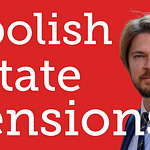In this Institute of Economic Affairs podcast, IEA Head of Media and Linda Whetstone Scholar Reem Ibrahim interviews Dr. Nima Sanandaji, Swedish author, researcher and public policy scholar known for his work on entrepreneurship, innovation and welfare reform. The conversation challenges the conventional narrative around the Nordic model, examining how the myth of successful Scandinavian socialism obscures a century of free market prosperity built on low taxes and economic freedom. They discuss Sanandaji’s co-authored IEA briefing paper “The Welfare State Myth” which analyses welfare outcomes across advanced economies over five decades.
Sanandaji reveals how Sweden’s economic success came from 100 years of low taxation and free market capitalism - including inventing the first company shares, central banking system and credit notes - before switching to high taxes in the 1970s led to stagnation and welfare dependency. The discussion examines comprehensive data comparing 30+ advanced economies, demonstrating that countries with lower taxes consistently achieve better welfare outcomes in employment, education and overall wellbeing. They explore how high-tax welfare states create poverty traps that particularly harm immigrants and young people, with evidence from Sweden’s policy failures and warnings about the UK’s trajectory toward mass welfare dependency.
The interview concludes with policy recommendations drawn from successful low-tax countries like Ireland, Estonia and Malta, advocating for school choice, apprenticeship systems, healthcare competition and reducing government bloat. Sanandaji argues that countries like the UK are repeating Sweden’s mistakes by combining Anglo-Saxon legal traditions with socialist high-tax policies, leading to economic stagnation and declining welfare outcomes. The conversation challenges policymakers to examine the evidence showing that economic freedom and lower taxation produce superior results for citizens’ wellbeing and social mobility.













